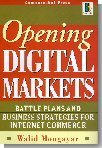|
| ||
 |
A Business Forum Book Review:
See also:
Electronic Commerce (eCommerce)Without the hype of e-commerce, today’s media serving finance and industry would wither. E-commerce (electronic commerce) is this year’s buzz word. But e-commerce is scarcely a pop phenomenon; it is swiftly and unstoppably becoming a dominant way in which business is being transacted. For many of our customers, it is becoming their preferred way of transacting business.

Opening Digital Markets: Battle Plans and Business Strategies for Internet Commerce, Second Edition by Walid Mougayar (McGraw-Hill. 292 pages, $24.95) is an excellent guide to "an increasingly open electronic marketplace [that] has already reached the point of no return. ... it presents a complete strategic perspective of what has to be done to fully exploit the Internet commerce marketplace by tying the various pieces together. The suggested process presented is a structured and methodical approach to dealing with elec-tronic commerce. It includes the following four stages: (1) evaluation and understanding, (2) strategy formulation, (3) technology implementation, and (4) business management." While there is not yet an accepted "Webster’s definition" of e-commerce, perhaps the most servicable definition has been offered by Randall Whiting, president and CEO of CommerceNet: "... electronic commerce is about a global electronic marketplace that enables all members of a value chain to interact spontaneously for mutual benefits. It provides an environment where customers are empowered to control the buying process more effectively, receiving and accessing personalized information. It provides a platform for complete relationship management, not just a one-time transaction."
Every product or service passes through a chain of distribution from origin to end-use. This traditional chain of distribution has now become known as the value chain because each link of the chain must be perceived by the customer as adding value to the product/service. The Internet enables information to be shared and transactions to be effected online in real time; the traditional chain of distribution is often scrapped, and a totally new value chain introduced. The power of e-commerce is to design this value chain to enhance dramatically the value we can now offer to our customers."The buyer/seller model is at the heart of what needs to be transformed electronically. We need to look at each one of these steps [in the value chain], and investigate their sequential and nonsequential relationships. The goal here is threefold:
- Replace as many steps as possible with an electronically enabled capability that brings the cycle closer to a closed-loop process.
- Start to tie various steps together as it becomes logically or financially feasible.
- Begin to measure the value derived from the new processes."
This new value chain must offer the customer demonstrably enhanced values in terms of breadth of buying choices, immediate confirmation of product/service availability, superior customer service/support, speed of transaction, ease of order tracking, guaranty of delivery, and assurance of best possible price. Perhaps most importantly, this new value chain can establish a totally new relational model -- customers are transformed from adversaries into colleagues. "Once you have analyzed the impact of the Internet on your distribution and value chains, you have to ask yourself, ‘Is the Internet a new channel or is it a new market?’ ... by treating the Internet as just another channel, you may be missing some of the necessary nuances of electronic microchannel segmentation."
Among the truly revolutionary online success stories presented in Opening Digital Markets (CommerceNet Press, an arm of CommerceNet) are:
- In 1997, Cisco Systems Inc. was doing over $5.0 million in sales per day from the Internet with its distribution partners. [Currently, sales are over $9.0 million per day.]
- By mid-1997, Microsoft’s Expedia announced it was booking over $2.0 million in travel tickets per week, and barely keeping up with demand.
- In October 1997, a year after the launch of its online store on the Internet, Dell Computers was selling over $3.0 million per day.
In conclusion, Walid Mougayar exhorts, "Every organization will have to be successful at exploiting the Internet for electronic commerce purposes. The earlier you start, the better you will be at doing it. Success in Internet commerce doesn’t depend solely on your Web site; more important, it will depend on how you strategically position your products and services vis-à-vis other Internet-based electronic communities and intermediaries, as well as how you facilitate your interactions with customers, suppliers, and partners."
Your comments and suggestions for these pages are most welcomed!
|
Email: editor@businessforum.com
|
URL: http://www.businessforum.com/opendigmkts.html
Revised: July 12, 1999 TAF
© Copyright 1998, 1999 Thomas A. Faulhaber / The Business Forum Online®, All Rights Reserved